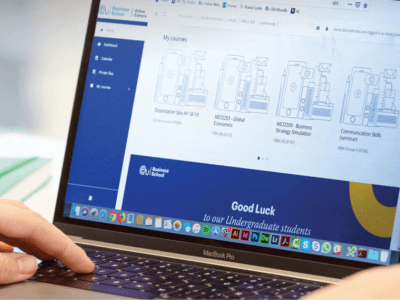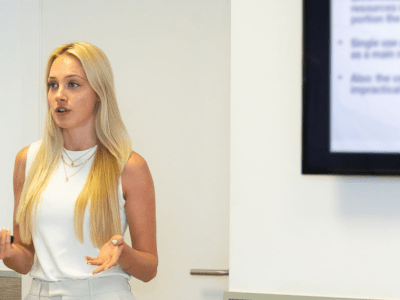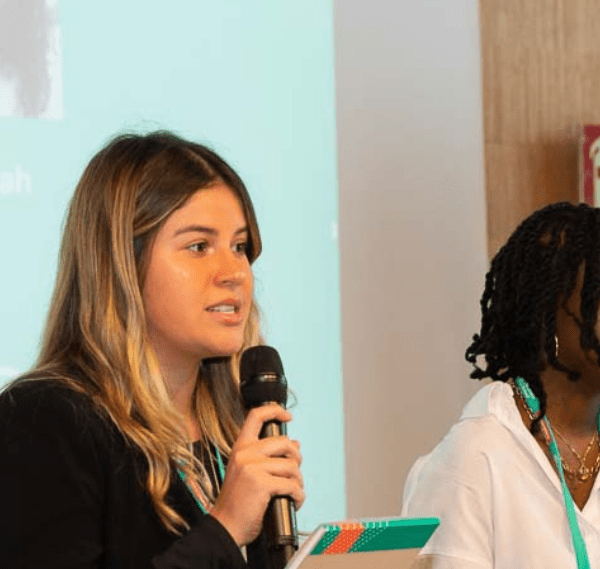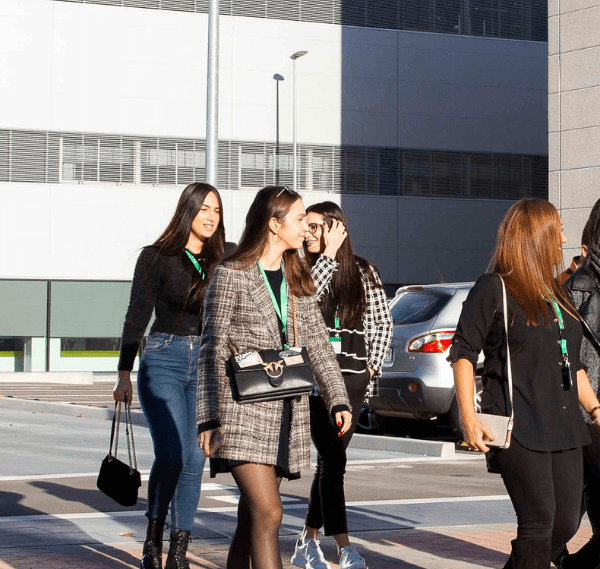Anastasia Barner, who founded her first company at the tender age of 20, addressed EU Business School students and shared her experiences as a young female CEO. Her company, FeMentor, became the first online reverse mentoring platform in the German-speaking world. It has since expanded and made its way into other countries. Anastasia has founded another social app named Catch Me, and in addition to her two businesses, she is the international TikTok face of German media company Deutsche Welle. She also sits on several advisory boards.
Anastasia certainly knows what it takes to be successful in the start-up game: her business is currently worth 7 million Euros, and it is only one year and four months old. She frequently speaks at higher education institutions, despite the fact that she has not yet even finished her own university degree. She is also approached by companies on a regular basis to talk about social media and female empowerment.
It is clear that female empowerment is a topic close to her heart. Her company was designed to support young women entering the business world, where she explained that they continue to be underrepresented.
Women in Business
Anastasia shared her unusual position in relation to the business landscape. As a young woman, she feels that sometimes she is not taken as seriously as her male peers. However, the fact that she is a woman also makes her a kind of “rockstar” in the start-up world. She is called upon to speak at many events, and though she has wondered if she is invited for her novelty value or to fill a quota, she nonetheless takes advantage of these opportunities to demonstrate the value of her work to brand-new audiences.
The statistics regarding women in business remain daunting for those wishing to break into it. Only 15.7% of founders in Anastasia’s home country of Germany are women. She explained that most women-owned businesses exist in three categories: beauty services, childcare and social assistance, and professional, scientific and technical services. The last category is also the smallest percentage, which is an unfortunate statistic seeing as these industries represent the most potential to make money.
There are, however, reasons to be optimistic. Anastasia shared that women-led tech companies have been proven to be more capital-efficient. Initiatives like her own business, FeMentor, are finding alternative routes for women into business. She also benefits from a strong support system in the form of other female founders: because they are a minority, they stick together and help one another whenever they can.
What Does FeMentor Do?
The purpose of FeMentor is to help females find a reverse mentor for free. Anastasia sees her role as a dual one: she wants to help young women understand why they need a mentor and then help them find one. FeMentor was the first reverse mentoring company in Germany, Austria, Switzerland and Greece. There are plans underway to expand the company into new countries, and Anastasia mentioned the possibility of a franchise model or building international business partners to support this growth.
The way FeMentor works is that students can be connected with older and more experienced mentors as they pursue their studies. However, the relationship is not just one-way. Both mentor and mentee teach one another simultaneously, sharing their own unique skills and perspectives. Anastasia explained that many companies are struggling to understand Gen Z: their social media preferences, their buying habits, and their approach to media consumption remain mysterious. This is one way in which mentors can benefit from a close connection with their mentees.
Reverse mentoring recognizes that young people have subjects they can teach, even to those who are older or more experienced. They take many of their skills for granted; for example, how to navigate Instagram. What reverse mentoring does is build a bridge between generations so that knowledge can be shared in both directions.
Why Do You Need a Mentor?
Anastasia was candid about the fact that mentors were of huge assistance when she herself had no idea what she was doing. She reminded students that, in the business world, a lot of information is closed off. For example, she had no idea what a typical day in the life of a founder looked like. Through her reverse mentoring experience, she was able to learn from the real experiences of her mentors. This helped her to grow in confidence.
She stated that Generation Z was more invested than previous generations in the idea of spiritual growth and personal development beyond the confines of career advancement. A mentor could also be beneficial to this process. A good mentor relationship should last a long time, perhaps even a lifetime, and this accompaniment on your journey can be a valuable site of reflection. It can lead to deeper understandings of who you are and what you want to accomplish.
When you have a mentor, you benefit from your combined experience. You also have the poortunity to gain access into a network that is otherwise difficult to build independently. If you have your own business, these relationships can end up saving you money on marketing and public relations: your audience is more immediately accessible. Anastasia told students that a mentor would allow them to see “behind the scenes” of the careers that interest them, so they know whether to pursue certain opportunities or not.
What Does Gen-Z Have to Offer?
Anastasia’s business is built on the idea of a generation gap, and she explained the unique contributions that she feels her generation is able to offer in the business world. Members of Gen Z were born between 1995 and 2010, which means that they are digital natives who have never known a world without the internet. They have lived their lives with immediate access to global news.
Due to these circumstances, Gen Z is less interested in conforming to stereotypes. They prefer to stand out, and they embrace their individuality. They also have a strong focus on ethics. This means that brands need to be inclusive and principled to truly reach them. Their media-consumption habits are very different from older generations. This is a problem for marketing departments staffed with older people who are out of touch with the Gen Z mindset.
FeMentor provides a point of connection, facilitating cross-generational collaboration. Rather than working against one another, Anastasia provides an opportunity for women of all ages in business to combine their knowledge and support one another to succeed. This objective is why she founded the organization and why she continues to advocate for the advancement of women in the world of business.










